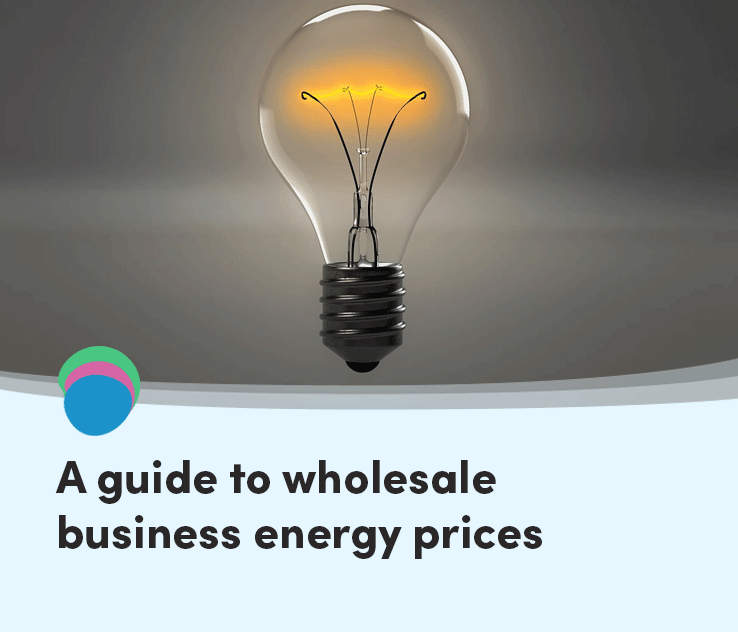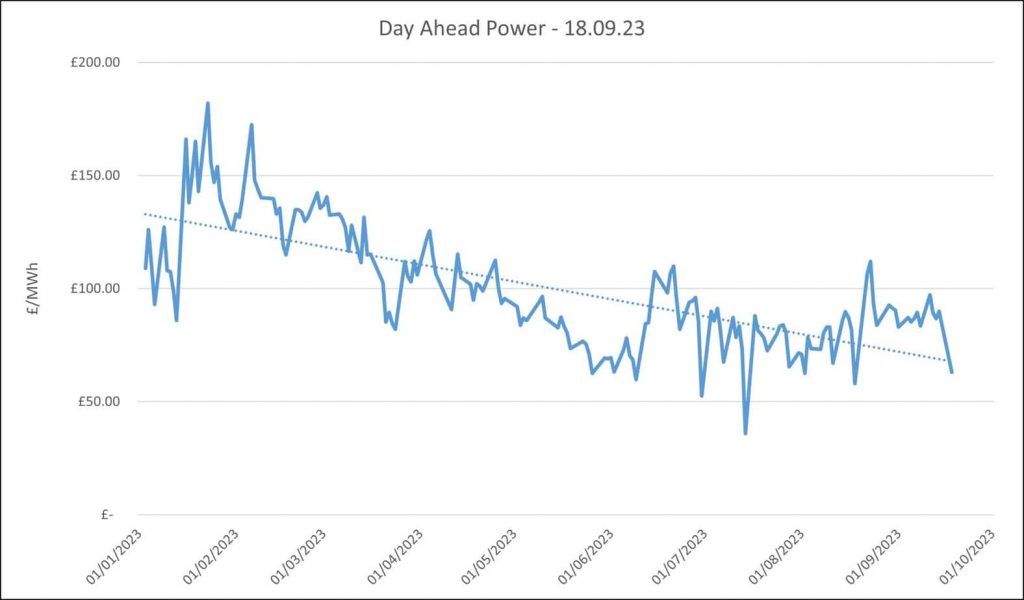Wholesale Energy Prices
A guide to wholesale business energy
Energy costs significantly impact your business’s monthly expenses. It’s crucial to know what you’re paying for. Your energy bill comprises several elements: network fees, operational charges, government policy costs, supplier profits, and other direct expenses. Yet, the most influential factor is wholesale energy prices, accounting for over a third of your total bill.
What is wholesale energy? How does its market function? Will its prices increase or decrease soon? Dive in to find out more.

Article Contents
Why does the energy market fluctuate?
The energy market might appear relatively stable from the perspective of a business customer on a fixed deal because you pay the same rates for the electricity your business uses throughout the duration of your contract. However, wholesale energy prices can change every day.
Prices are set by traders on the global market. One reason for the energy market to rise and fall is the demand for energy, both from business customers and for household energy.
The reason for the volatility of the energy market goes beyond the simplicity of supply and demand. There are added complexities from many factors that are interconnecting. Together, these factors affect the stability of the energy market and cause fluctuations in the rates we pay. For example:
Weather
Both hot and cold weather puts greater demands on the National Grid because of increases in energy usage. The greater need for power and heating pushes prices up. These pricing increases come from wholesalers and the global importers and exporters of energy. Appliances that use more units of energy, or kWh, to run, such as air conditioning systems, will have a greater impact.
Natural disasters and civil unrest
The global supply of energy can be impacted by natural disasters or incidents, as well as stresses from war, civil unrest and the impact of political decisions. All of this can affect and sometimes even block the supply, threatening the availability, increasing the demand and then driving the wholesale cost of energy up.
Even the likes of currency movements and shipping prices can have a knock-on effect that greatly impacts the wholesale cost of electricity. These changes are all interconnected and will alter the price you pay for power as a business consumer.
How do wholesale prices impact energy bills?
The UK’s energy regulator, Ofgem, collects data for monitoring and analysis of the wholesale energy market for gas and electricity. Key market outcomes can be drawn from Ofgem’s analysis of the wholesale price of gas and electricity, which it says has, “a significant impact on retail bills.”
Ofgem also states: “Understanding how and why wholesale prices have changed helps us understand why retail bills have changed.”
Energy companies tend to blame their higher tariffs on external factors such as the wholesale energy market and will increase unit costs in line with wholesale price rises. According to Ofgem, wholesale energy prices account for a large proportion of energy bills. This typically makes up almost half of each energy bill.
Other factors that affect what your energy company charges you for your energy bills include:
- network and distribution costs to deliver the energy to customers,
- operating costs, customer service and account management,
- government taxes such as environmental and social levies.
On top of this, the price you pay for energy will also be affected by:
- your business energy consumption,
- the energy efficiency of your business premises,
- your chosen energy supplier and tariff,
- the type of contract you have chosen.
When you are thinking about changing your energy contract, consider how timing and other factors may affect wholesale prices. The rates offered on energy tariffs will peak during the winter months because these months are dark and cold, driving up the price because there is a higher demand for heating and lighting so that our homes and offices are comfortable.
January and February are generally the worst months to renew or switch your contract because energy companies are affected by the wholesale energy market. Quotes during these months will often provide the worst value for money.
What are the current wholesale electricity prices in the UK?
As of 2023, electricity prices in the United Kingdom have decreased to approximately £80 per megawatt-hour, marking one of their lowest points since the beginning of August. This decline is anticipated to persist, especially since Ofgem, the British energy markets regulator, has declared a 7% cut in the price cap for household energy bills, set to take effect from October 1st.
In the previous year, wholesale power and gas prices in both Britain and Europe soared to unprecedented levels, primarily due to disruptions in gas supplies stemming from Russia’s invasion of Ukraine. Fortunately, these prices have since retreated, with the market regaining stability and energy suppliers restoring their financial health.
However, as the UK nears the colder winter months, electricity prices are projected to climb once more, influenced by the usual seasonal variations in energy consumption. Notably, the United Kingdom Electricity Price peaked at an all-time high of 580.55 in September 2022.
The market dynamics of the past, such as the energy price spikes in 2013, 2016, and 2018, and the average bill increase by the Big Six energy suppliers from £474 in January 2010 to over £750 in June 2019, continue to shape the energy landscape.
Additionally, significant political events in 2016, like the Brexit referendum, had a marked impact on the market. The wholesale cost of electricity surged by 20% just before the referendum. Following the decision to exit the European Union, prices briefly dipped but soon ascended again. The 2008 financial crisis also saw considerable energy market peaks, with energy rates nearly doubling and the Big Six suppliers implementing sharp price hikes.

How do fuel sources impact wholesale costs?
The composition of energy sources plays a pivotal role in determining the wholesale cost of energy. Factors such as the origin of the fuel and the existing stock levels can influence prices.
The UK’s commitment to reducing carbon emissions has ushered in a transformative era for its energy generation systems. This shift is evident in the growing prominence of renewable energy sources. The UK government’s recent decision to reinstate financial support for wind and solar projects has bolstered the nation’s appeal to renewable energy investors.
While renewable sources like solar and wind power are steadily gaining traction, traditional non-renewable sources like coal and gas still constitute a significant portion of the UK’s energy mix. Nuclear power also contributes, albeit to a lesser extent.
For conventional non-renewable energy generation, fuel costs can vary based on the wholesale prices of gas, oil, and coal. In contrast, most renewable energy projects, once set up, have negligible ongoing fuel expenses.
The balance between renewable and non-renewable energy generation at any given moment directly affects the wholesale market price. As the UK continues its transition towards more sustainable energy sources, this interplay will remain a key determinant of energy costs.
When should you renew your electricity contract?
Timing is everything when it comes to renewing your business energy contract. In the current economic environment, with inflation and energy prices reaching record highs, the decision of when to renew becomes even more critical. By not securing your upcoming contract renewals promptly, you expose your business to the risk of escalating prices.
Here’s why you should prioritise your renewals:
Flexibility is Key
The decision of when to renew can be intricate, requiring a deep understanding of your business’s energy consumption patterns. Opting for a fixed contract at an inopportune moment might result in your business paying above the prevailing market rate. On the other hand, a flexible energy contract can mirror the energy market’s highs and lows, allowing you to distribute purchasing points and mitigate market fluctuation risks.
Evading Soaring Prices
The surge in energy prices is undeniable, pushing many households and businesses towards energy poverty. Proactively exploring renewal options and obtaining quotes well in advance can help mitigate these risks. While waiting for prices to drop might seem tempting, it’s not always the best strategy. A consistent and well-thought-out plan can free up resources, allowing your business to focus on other essential aspects.
Forward Planning
The energy market’s unpredictability underscores the importance of securing the right contract. Flexible procurement facilitates long-term planning, saving you time in the long run. For instance, a long-term flexible contract reduces the need for frequent market assessments, letting experts manage price fluctuations on your behalf.
Expert Assistance
Navigating the energy market and choosing the best solutions can be daunting. Utility Saving Expert specialises in flexible energy procurement, aiming to reduce costs and offer adaptability in a dynamic commercial environment. With budget certainty becoming pivotal for survival, flexibility is paramount. Utility Saving Expert’s comparison tool continuously monitor the markets to secure the best prices, ensuring transparency and effective account management.
To optimise your business’s energy costs, it’s essential to stay informed, compare tariffs, and switch contracts as your current one concludes. Using tools and expert advice can further streamline this process, ensuring you get the best deal possible.
Why compare and switch business energy contracts with Utility Saving Expert?
Navigating the realm of business energy can be complex, especially when contrasting it with household energy plans. However, understanding these nuances can be advantageous for businesses.
Distinct Pricing Structures: Business energy tariffs, encompassing both business gas and business electricity, are tailored differently than domestic ones. Given that businesses generally consume more energy than households, they often benefit from more competitive rates. Suppliers recognize this higher consumption and frequently offer businesses reduced unit prices and enhanced deals.
Factors Influencing Your Bill: Your energy costs are influenced by various elements, including your business size, energy consumption patterns, and the specific tariff you select.
Potential Savings: On average, businesses have saved up to £1,067 by comparing and switching to better business electricity deals through platforms like Utility Saving Expert.
Understanding Business Energy Contracts: Business energy contracts can be either fixed or flexible. Fixed contracts offer a consistent rate throughout their duration, providing businesses with predictable energy costs. In contrast, flexible contracts can fluctuate with the energy market, allowing businesses to capitalize on market lows but also exposing them to potential highs. The choice between these models depends on a business’s consumption patterns and risk appetite.
Time-of-Use Tariffs: Some businesses might benefit from time-of-use tariffs, where energy rates vary depending on the time of day. This can be advantageous for businesses operating predominantly during off-peak hours.
Other Determining Factors: Several elements can impact your business energy prices, such as business type, location, credit rating, and consumption volume. For instance, businesses operating outside peak hours or located in major cities might secure better rates.
Expert Guidance: Finding the right energy supplier and tariff can be challenging. Platforms like Utility Saving Expert offer expert insights, helping businesses identify the best energy deals tailored to their specific needs.
To ensure you’re getting the best value for your business energy needs, it’s crucial to regularly review and compare available options. Leveraging tools and expert advice can help streamline this process, ensuring optimal savings and efficiency.

Chris Richards
Chris is a personal finance specialist who founded Council Tax Advisors in 2012, assisting over 250,000 people with their Council Tax debt. Observing that many clients overpaid on utilities, he launched Utility Saving Expert in 2014, an energy price comparison site. In 2016, the platform expanded its services to include consumer and business insurance comparisons. Utility Saving Expert stands out with its commitment to social responsibility, donating 10% of net profits to fuel poverty charities, underscoring its dedication to both client value and community support.
